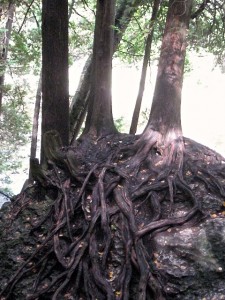 These past few months I have been contemplating my rootedness in life and how it has served or hindered me over the years. I also have seen this question arise in my clients’ work over the years and I know that there are blessings as well as some traps in being deeply and soundly rooted in the past.
These past few months I have been contemplating my rootedness in life and how it has served or hindered me over the years. I also have seen this question arise in my clients’ work over the years and I know that there are blessings as well as some traps in being deeply and soundly rooted in the past.
Years back, when going through my psychotherapy training I was asked to look back, not only on my own life but also those of the people who came before me: my parents, grandparents, and great-grandparents. It was an enlightening exercise as it showed me how much of who I am was based on their life experiences, fears, hopes, joys, and pains (I recommend the exercise for anyone who is interested in finding out more about what ‘makes them tick’, as they say). And because of my own interest and leanings I also have looked deeply into my lives before this life, my past incarnations as much as I can remember them. I have come to realize that I — like everyone on this planet, I believe — have some very long and deep roots that tie me to the peoples and histories of our Mother Earth.
I believe that one of the big traps in thinking about rootedness — and experiencing it — is in confusing having strong roots in the past with living in the past. This doesn’t always happen consciously and it isn’t always apparent. It’s not that a person does things like his parents did them, or that she wears clothes that were fashionable 20 years ago. It’s not speaking in old-fashioned ways or even having old-fashioned values and ideas. It is about the place a person is living from.
Our actions, decisions, and beliefs all have to be founded on something. When we are young they are usually based on our parents (or care-givers) actions, decisions, and beliefs, either mirroring them or being the opposite. Over time we experience life on our own and in a healthy system we are encouraged to come to our own conclusions, choose our own actions, make our own decisions, and form our own beliefs. We are allowed to live in the present and let the past of our family’s experiences inform how we form this present.
However, even in those best-of situations our new actions, decisions, and beliefs are usually based on things from the past: the new philosophy of life, religion, or political association we found is rooted in the past; the person we choose as a mentor has come to her actions, decisions, and beliefs through her past; the course of study or the career we pursue has developed over time; we live in a society that has its own history or is build on the histories of many cultures. And beyond all that we are influenced by the things we have brought with us from past-lives.
So, living in the past is always a possibility. Not living there takes conscious effort. It requires us to awaken a bit more every day, awaken to ourselves, our own history and that of the world we have chosen to live in. It requires us to decide which parts of that history we want to honour and which it is time to let go. It isn’t always easy to do so. It requires us to look at the not so pretty parts of ourselves as well as to honour and relish in the beauty of who we are and can be.
Honouring a part of our history doesn’t mean living it just as it was taught. It means truly understanding it, its origin and original purpose, integrating that into our lives and making it our own, thus renewing it and giving it new, relevant, and enlivening energy. For example we may be in a serious relationship and consider marriage. We could get married for legal and financial reasons, we could do it because our tradition and family expects us to, or we could look at what the spiritual and emotional meaning of marriage, explore what that would mean in our lives and decide based on that understanding to get married and live in the marriage to the best of our abilities.
Equally, letting go of a part of our past that isn’t helpful anymore isn’t about just forgetting it or pushing it aside. It is about honestly looking for remnants of it in our actions, decisions, and beliefs and consciously replacing it there with new energy.
For those who live in and from the past, either one of those actions is almost impossible to take. Their safety, their self-identity is tied to the roots that made them. Considering the possibility of criticizing or even taking away one of those roots is frightening and painful. Even considering new roots being build to support some of the old structure can be frightening as it requires us to take a closer look at the whole system that our lives have become.
Living in the past means always looking at our roots, afraid they may be harmed, worried about what will happen when they fail — as we instinctively know they will sooner or later — putting all our energy into propping them up, keeping them as unchanged as possible. It means living from other people’s values. It takes us away from living life.
Living from our roots is a very different experience. Living from our roots means being aware and awake to all we are, here and now as well as in our history. It is being awake to all that has shaped us and being choicefull in what of that we bring to bear in the present moment. It also means being willing to change constantly. If we truly live from our roots we accept that no living thing (roots are a sign of a living thing) ever is unchanging. Roots grow. Roots die. Roots expand and contract, reach further back and higher up, grow denser here and thinner there. Roots keep the life they support ever changing. Our roots help us grow and evolve on a daily basis. Living from our roots means accepting that some of them are rotten and have no more purpose in our lives. Living from our roots may also mean having to accept that the soil we have been planted in — our social environment in any of its manifestations — may not be right for us.
Finally, there is the option of living in spite of or without any acknowledgement of our roots. It is possible to live this way and many people do. It is the idea of “That is in the past, it’s gone. I don’t want to dwell on that, I want to live in the here and now.” We may want to deny our past and that of our families and cultures because they are too painful to look at and deal with. But living without any acknowledgement of the past is living without acknowledgement of what got us to where we are, of what made us who we are so far. It means running from something that we don’t even know. A good image of that is the nightmare in which we are followed by a dark hooded figure and we awaken every time just before the figure finally reaches us and touches us. That figure is our past, running after us and having us scared. But fear usually is disproportional to the actual danger of the thing we fear. Living in denial of our roots is living from the fear of what we might find there if we looked.
Living in denial of our roots means we are depriving ourselves of a whole lot of information and potential. It is almost impossible to selectively deny parts of our past so either we throw out the good with the bad — for example, the memories of a loving mother together with those of her when she had been drinking, or our imagination together with our frightening psychic abilities — or we are constantly on the lookout for the unwanted bits and can’t really enjoy the ones that we have chosen to keep around.
Lao Tzu said: “If you’re depressed, you’re living in the past. If you’re anxious, you’re living in the future. If you’re at peace, you’re living in the present.”
If you allow me to rephrase the old master to include the imagery of roots, it may sound something like this:
“If your life feels stagnant, fearful, restricted, if you feel old before your day, you are living in the past, relying only on your roots.
If you are always worried about the next moment, have an eye out for the next thing to support you, and feel dependent on support from outside yourself, you are living in the future, denying your roots.
If you are willing to be awake, honest, evolving, accepting, if you are your true self to the best of our abilities, you are living in the present, from your living roots.”
Looking at my own life I have see that somehow I managed to live from my roots a lot of the time. This has allowed me to muster the courage to go one when things got dark, to see the beauty even on rainy and grey days, and to find that famous silver lining in the gathering storm clouds. I’m not a master at this at all. I fall back into the trap of anxiously preserving old roots or worriedly looking for that extra support out there in case my roots proof faulty. But sooner or later I wake up to the one big truth: this soul that is me, that energy that is rooted in the past and stretching towards the future and is right now living this life here. It has fallen and come up again several times, it has been felled and cultivated, clipped and been left to grow wild, it has been over-watered and starved — and it has survived it all and come back to be here again.
Next time you feel that your life is too uprooted or you are too tied up by your past, consider this: You have done this all before and you got back here. Like a tree whose trunk has been cut, your roots survived and sprouted again. Maybe some of them need a little pruning, fresh soil, a little less water — whatever it is, if you take an honest look and give them a bit of attention without getting hooked on caring about them to the expense of the life they support, there is a good chance that they will sprout new, strong, healthy life once again.

